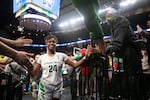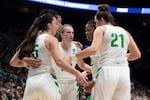One year ago, the Oregon Ducks women’s basketball team was on the verge of making history.
The Ducks had won the Pac-12 Conference Championship in March and the NCAA Tournament was up next. All signs were pointing to another trip to the Final Four and a potential title, a run led by their star returners: guard Sabrina Ionescu and forwards Satou Sabally and Ruthy Hebard.
Then came a new opponent: COVID-19.
Hebard was in Eugene when she got a text message from head coach Kelly Graves.
“We had just finished the Pac-12 Tournament in Las Vegas, so coach said to just stay wherever you are since it was our week off,” Hebard said.

Ruthy Hebard high-fives fans as she heads to the locker room following the Oregon Ducks' win over South Dakota State in the Sweet 16 Friday, March 29, 2019.
Kaylee Domzalski / OPB
At first, there was no talk of canceling games, so the Ducks were cautiously optimistic that they’d be able to play again.
“I think they just wanted to see what was going on,” Sabally said. “I’m still thinking that we would play the national championship because there’s no way they’d cancel the national championship.”
But the virus spread, quickly. On the heels of closures and shutdowns nationwide. Oregon Gov. Kate Brown issued a stay-at-home order aimed at curbing the spread, or “flattening the curve.” Business started to close and schools transitioned to online learning. Hebard got another text message from her coach: Our season is canceled.
“It sucked,” Hebard said. “I didn’t see some of my teammates afterwards, and that was pretty unreal.”
Like their classmates, the Ducks finished the rest of the school year online. Sabally finished the year at home.
“It was hard to get organized and get everything figured out online with the communication,” she said.
Sabally and Hebard both planned to turn professional at the end of their college careers, so they kept working out, albeit creatively.
“For a few days, I got to work out in Matthew Knight Arena, but then that closed,” Hebard said. “It was warm enough outside, and I worked out with Satou on a track or a field. Some of our friends had little gyms”
Starting a pro career, virtually
The WNBA Draft was held in April, remotely. Ionescu was the first pick. Sabally went second to the Dallas Wings and Hebard went to the Chicago Sky with the eighth pick. Prior to the draft, the WNBA had decided to postpone the start of the 2020 regular season. The season was originally supposed to start on May 15th and each team was to play 36 games.
The league eventually agreed to start a shortened season in July and to pay players their full salary. The 22 games took place inside the “wubble,” the WNBA’s bubble at the IMG Academy, a private boarding school and athletic training facility, in Florida. Players had practices or games almost every day, and they stayed in hotels, houses and apartments on the campus. They could take a bus or rent a bike to get around the facility. To keep everyone safe, the league-mandated COVID-19 Protocol: onsite testing every day, spaces to quarantine and playing games in near-empty gyms.
“It was weird with no fans,” Sabally said. “You were definitely missing that aspect of the game.”

Oregon Ducks basketball players huddle during the first half of an NCAA Tournament game against South Dakota State on Friday, March 29, 2019, at Moda Center in Portland, Ore. Oregon won 63-53.
Kaylee Domzalski / OPB
But though there were no fans in the gyms, players knew they would be getting more eyes on their sport. They dedicated the season to social justice, with players protesting police violence and structural racism in the United States. They wore uniforms with Breonna Taylor’s name on the back, and the WNBA and its players’ association launched a new platform, the Justice Movement, honor the Black Live Matter Movement and the #sayhername campaign.
For many of the players, the season itself felt similar to the AAU travel basketball environment they experienced growing up, when they would play three or four games a day against opponents they came to know well. The former Ducks got to play against each other, then catch up within the wubble on their days off.
“It’s bittersweet to see them play with their new teams,” Hebard said, “but it’s also special.”
After the WNBA season concluded, the players rested for a bit, then prepared for another full season overseas. It’s common for female basketball players to play year-round because they make less than their male counterparts; in 2020, the average NBA salary was $7.7 million. The average WNBA player makes just over $100,000 a year.
After the wubble, Hebard and Sabally both headed to Turkey. Hebard said that she only got four days’ rest between the end of her WNBA season and the trip overseas, where she plays in Ankara. Sabally plays for a team in Istanbul.
The games in Turkey do include fans, though in a limited capacity. After that season ends in March, both players will return to the United States to get ready for the next WNBA season. They’re out of the wubble but very much in the grind of their pro careers -- even amid a pandemic.
